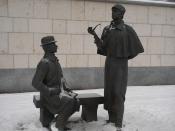In the report Watson wrote to Holmes concerning incidents surrounding Henry Baskervilles and the moor, his use of creative descriptive language revealed his romantic and imaginative feature. In contrast of Holmes, he was not mechanic, he always apply metaphors, similes, personifications and also some vivid adjectives to build up an atmosphere. ÃÂ[The] God-forsaken corner of the worldÃÂ referred to the quite isolated moor and this informal adjective gave the feeling of deserted more appealing. He admired the beauty of this enchanting land, he said, ÃÂThe longer one stays here the more does the spirit of the moor sink into oneÃÂs soul, its vastness, and also its grim charm. When you are once upon its bosom, you have left all traces of modern England behind youÃÂ ÃÂ ÃÂ It was such a fascinating example of personification and it showed his enthusiasm of the moorÃÂs charisma. It made the reader actually enjoy his fanciful writing.
Besides, he was also very imaginative as seen through his romantic piece of writing. ÃÂÃÂ ÃÂ if you were to see a skin-clad, hairy man crawl[ed] out from the low door, fitting a flint arrow on to the string of his bowÃÂ ÃÂ ÃÂ This illustration was brought into the minds of readers deeply since it would not be the style of Holmes or anyone else, but only the imagination of Watson. Moreover, Watson described Miss StapletonÃÂs brother to be giving ÃÂthe idea of hidden fires.ÃÂ It was a total abstract and non-concrete description that once again revealed his romance. From this report to Holmes, Watson expressed his romantic and imaginative personality which could have been both an advantage and as well a disadvantage to him for being a detective, since imagination was no doubt useful, however it depended on whether it was the right time to apply.
Another thing noticeable in the report to Holmes was that Watson got carried off with the neighbours that he met and this showed that he was quite interested in peopleÃÂs characteristics. He talked about the Stapletons abundantly for a paragraph which was quite not so necessary. His observations and assessments on them told it all. ÃÂÃÂ ÃÂ she is a very fascinating woman. There is something tropical and exotic about her which forms a singular contrast to her cool and unemotional brother.ÃÂ He first talked about how Miss StapletonÃÂs loveliness attracted Mr. Henry Baskervilles, then, he started to get off this topic and shifted the focus onto her brother, ÃÂHe has certainly a very marked influence over her, for I have seen her continually glance at him as she talked as if seeking approbation for what she said.ÃÂ He was like studying on them and was so fascinated in them that even at the end he said, ÃÂYou would find him an interesting study,ÃÂ (referring to Mr. Stapleton). Watson was being so distracted to his neighbour-Ms. Stapleton that I now suspected if there was a reason concerning infatuation and fancying in it. Though Watson being carried off with people suggested that he was a sensitive person with good observation, it also implied that he wasnÃÂt as qualified being a great detective as Holmes since he got distracted so easily and it may be an obstacle for Watson on the path to be a successful detective.
Doyle, C. Arthur. The hound of the Baskervilles. USA: Broadview press. 2006.



Inadequate structure
The essay needs far greater structure. Requires a definite opening paragraph outlining the major ideas of the essay as well as a conclusion to round it off.
0 out of 0 people found this comment useful.